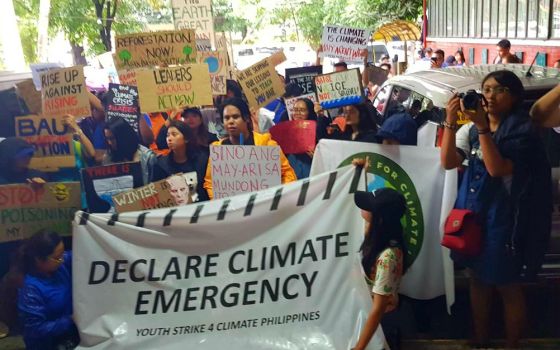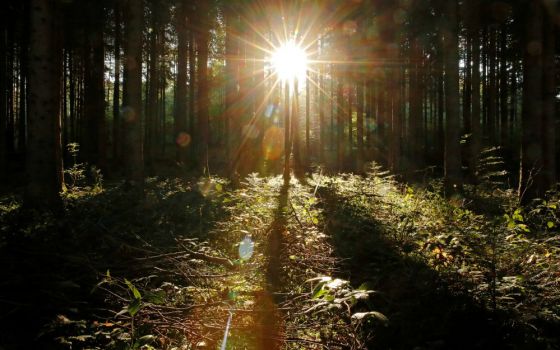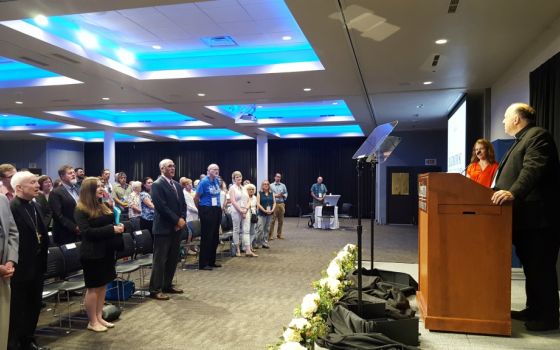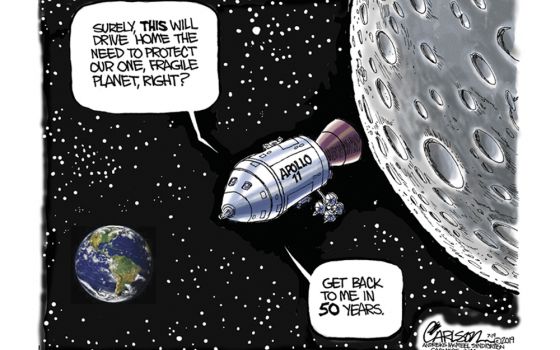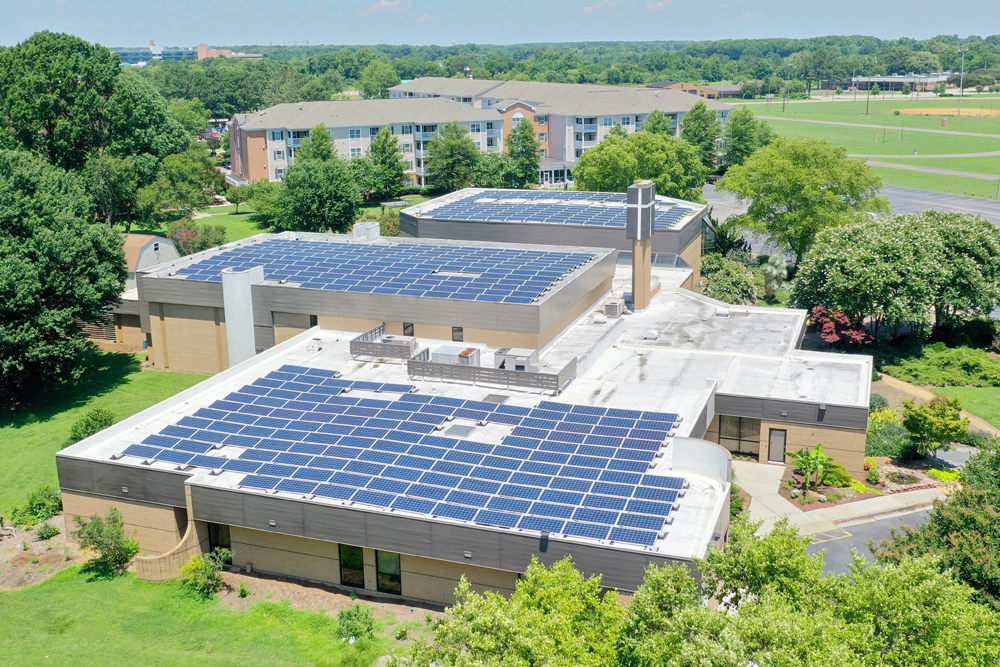
A total of 440 solar panels were installed in June on the church building roof at Immaculate Conception Catholic Church in Hampton, Virginia. (Vy Barto)
There's a new energy these days at Immaculate Conception Catholic Church in Hampton, Virginia.
In mid-June, the southeastern Virginia parish flipped the switch on a 142-kilowatt solar energy system that will generate 100% of the parish's energy use from the sun.
A total of 440 solar panels now dot the roof of the church building. It is the first parish to complete a solar project with Catholic Energies, a program of the Catholic Climate Covenant aimed at helping church organizations implement solar power and energy efficiency projects at no cost to the institution.
Through a power purchase agreement with Red Lion Renewables, which fully financed the $350,000 project, the solar panels will save Immaculate Conception 14% on its monthly electric bill and is projected to cut parish energy costs by $125,000 over 15 years. The panels are also expected to prevent the release each year of roughly 230 tons of carbon dioxide — the equivalent carbon emissions from 25 homes' total energy use for one year.
The cost benefit was not the only factor pushing the parish to solar energy, said pastor Fr. John Grace at the dedication ceremony June 15.
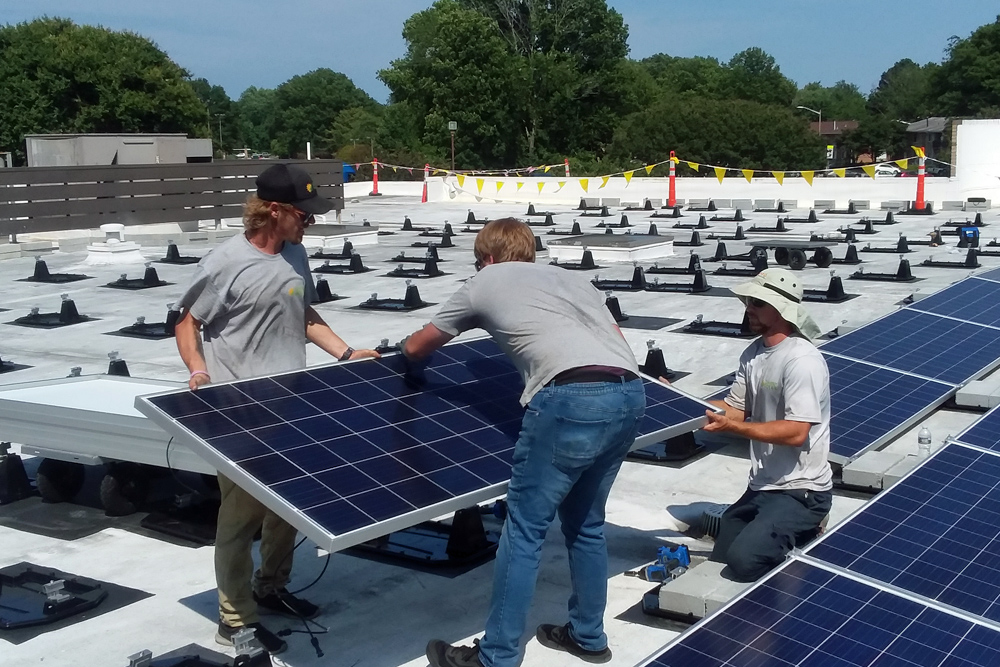
Workers install solar panels on the roof of Immaculate Conception Catholic Church in Hampton, Virginia. (Courtesy of Fr. John Grace)
"I'm not interested simply in, 'Can we as a parish save a few bucks?' " he said. "I am interested in terms of the witness value of this parish for a much larger world."
The symbolism of the parish reducing its dependence on fossil fuels isn’t lost on residents of this coastal community just north of Virginia Beach. The region is among the most vulnerable in the country to tidal flooding worsened by climate change. A 2018 report from the Union of Concerned Scientists estimated that more than one-third of homes in Hampton are at risk for chronic flooding by 2100.
Immaculate Conception, home to about 700 families, is the first parish in the Diocese of Richmond, Virginia, to go solar, and is among the latest religious communities nationwide to examine ways to limit their carbon footprint. Nearly 800 Catholic institutions, including the Richmond and Arlington Dioceses in Virginia, have signed the Catholic Climate Declaration pledging to take steps to meet the goals of the Paris Agreement on climate change.
In early June, Catholic Charities of the Washington, D.C. Archdiocese announced plans to install a 2-megawatt solar array, which will offset 100% of electricity use from the 12 buildings it operates in the district and surrounding Maryland area. The ground-based system, also through Catholic Energies, is estimated to offset 3,400 tons of carbon dioxide emissions, or 1,686 tons of coal burned. It will be the largest such solar energy system built in the D.C. area.
At Immaculate Conception, it took roughly nine months to turn the idea of a solar array into reality.
Grace, who arrived as pastor last summer, was exploring energy efficiency measures for the church when he discovered Catholic Energies, which launched in October 2017. The energy project program examined past energy bills and the feasibility of solar at the church. They also took the lead in identifying potential investors and contractors.
As the pastor discussed the project with the parish councils, he also reached out to other churches across the country that had installed solar to get more information about not only the how-to but also how it can transform the parish community.
"I didn't want this simply to be 'Oh, good, we're going solar,' " Grace told NCR. "I wanted this actually to be part of the beginning of a renewed effort by the parish to care for God's creation."
An advantage for Immaculate Conception is its large, flat roof. Another is its location in a state-designated economic development zone, making it more attractive to financers. After signing a contract in February, Catholic Energies led the effort to secure funding and select a solar contractor. As part of its power purchase program, the parish had no out-of-pocket expenses for installation or ongoing maintenance.
The Richmond Diocese also had to sign off on the project, as it owns the parish. Grace said the diocese was supportive, though somewhat surprised as no one had asked for such permission before.
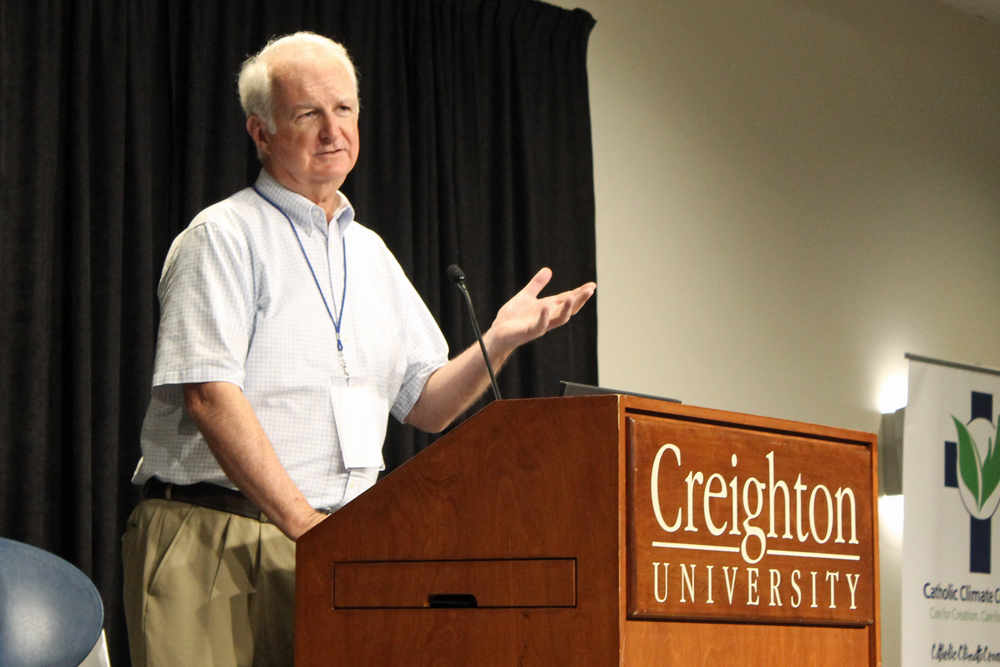
Fr. John Grace speaks July 29 at the conference "Laudato Si' and the U.S. Catholic Church," held by Catholic Climate Covenant at Creighton University in Omaha, Nebraska. (NCR photo/Brian Roewe)
As the solar project progressed, Grace provided regular updates at Masses. Often, his announcements were greeted with applause from parishioners. After one liturgy, an older woman told the pastor, "I'm just so proud to be part of this parish."
The solar panels have had another unexpected effect: attracting younger adults to the parish.
"Somebody told me, 'I had no idea the Catholic Church cared about this, enough to act on it,' " Grace said.
Immaculate Conception hopes the solar panels will boost and renew awareness of environmental issues within its community. Already, the Sunday Supper program that offers weekly meals to the hungry has begun using dishes and plates instead of disposable versions, and the parish is planning its second round of study groups on Pope Francis' encyclical "Laudato Si', on Care of Our Common Home."
While the cost savings are helpful, Grace said the parish's first consideration was the responsibility as a Catholic community to be good stewards of creation and to live out the interconnectedness with the environment and other people that Francis has stressed.
"It's really about being a good neighbor and doing our part of impacting for good, caring for creation," Grace said. "… That we are consuming less fossil fuels. That we are, therefore, lowering the amount of trash in the air. Well, that's what good neighbors do for others."
[Brian Roewe is an NCR staff writer. His email address is broewe@ncronline.org. Follow him on Twitter: @BrianRoewe.]
Advertisement




